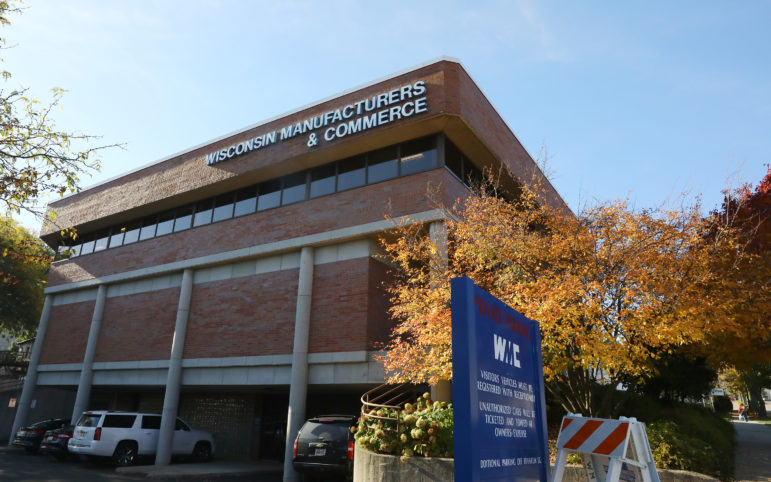State Business Group Has Massive Clout
WMC has secretly raised and spent $41 million on elections in last 15 years.

Wisconsin Manufacturers and Commerce. Photo by Riley Vetterkind / Wisconsin Center for Investigative Journalism.
Wisconsin Manufacturers & Commerce (WMC), which is the state’s largest business organization, has been a leading spender on outside electioneering activities and on lobbying for the past 20 years.
To date, the group has secretly raised and spent about $41.3 million since January 2006. WMC directs most of its election spending on broadcast advertising to praise conservative and Republican candidates and attack Democrats.
The top recipient of WMC’s outside election spending has been Walker. The group shelled out an estimated $10.7 million to back Walker in his 2010 general, 2012 recall, and 2014 and 2018 reelection contests.
Before 2015, candidates and outside special interest groups that sponsored issue ads to support or oppose a candidate were not allowed to coordinate negative broadcast ads and other electioneering activities. But in 2015 the state Supreme Court’s conservative majority ended a John Doe probe into campaign coordination between Walker and special interests during the 2011 and 2012 recall elections for governor, lieutenant governor and 13 state Senate seats. The high court’s controversial ruling also struck down key elements of the state’s campaign finance law.
WMC reportedly was among numerous ideological and trade organizations that were subpoenaed in the John Doe investigation. And WMC and two other groups connected to the investigation spent an estimated $8.3 million between 2007 and 2013 to help elect four of the high court’s conservative members at the time.
After the court’s decision, Walker and the GOP-controlled legislature passed laws that further weakened campaign finance laws and eliminated the nonpartisan Government Accountability Board. WMC and other powerful special interests supported those laws.
In addition to its outside election spending, WMC also funnels direct contributions to candidates through a political action committee (PAC) and a conduit, which is a legal check-bundling outfit for individual contributions.
Between January 2007 and December 2020, WMC PAC and large individual conduit contributions totaled about $938,000 to legislative and statewide candidates and fundraising committees. All but $11,000 went to Republican legislative and statewide candidates and five conservative state Supreme Court candidates. (That’s 99 percent to GOP and conservative candidates.)
The top recipients of WMC’s PAC and conduit contributions were:
Walker, $229,370;
Republican Assembly Campaign Committee, about $83,470;
Committee to Elect a Republican Senate, $76,150;
Former GOP Senate Majority Leader Scott Fitzgerald, of Juneau, $39,470;
Former Republican Attorney General Brad Schimel, $28,300.
Many of WMC’s conduit contributions are likely made by the owners and executives of its 3,500-member businesses that hail from more than a dozen special interest groups, including business, manufacturing, energy, insurance, health care, transportation, construction, real estate, finance, tourism, agriculture, road builders, natural resources, and telecommunications.
WMC is also one of the top-spending special interest groups lobbying at the State Capitol. Between January 2011 and December 2020, the group has spent about $6.3 million to on a pro-business agenda that includes lower taxes on businesses and the wealthy, environmental deregulation, weak campaign finance laws, and anti-labor and anti-consumer measures.
Some of the state laws backed by WMC’s lobbying and election spending include:
A covid-19 response bill that made it more difficult for police, firefighters, and other first responders to qualify for workers compensation, at the behest of WMC;
A $3 billion state giveaway and breaks on environmental laws to Foxconn, a Taiwanese company that promises to build a large manufacturing plant in Racine County. The 2017 contract between the company and the state has since been rewritten after Foxconn sharply scaled back its original plans for the project;
Severely restricting public employee collective bargaining rights, which drew national attention and generated massive protests at the State Capitol and historic recall elections for governor, lieutenant governor, and 13 state Senate seats in 2011 and 2012;
A right-to-work law that prohibits requiring workers to make payments to unions as a condition of employment;
Overhauling the state’s civil service hiring process by eliminating the requirement that job applicants take exams and shortening the process used by employees to appeal their discipline or dismissal by more than half, among other things;
Looser state regulation and oversight for the repair and replacement of controversial high-capacity wells used by factory farms, food processors and mining operations;
Loosening several state environmental safeguards for mining. The measure was requested and largely developed by Gogebic Taconite, a subsidiary of an out-of-state mining company that wanted to develop a massive open-pit iron mine in northern Wisconsin. The company’s plans have since fallen through;
Repeal of the state’s moratorium on nuclear power plant construction;
Reducing state lead paint inspection and testing requirements;
Restricting the legal options for victims of asbestos-related injuries who sue asbestos companies for damages;
Limiting liability against long-term care providers in civil lawsuits, placing stricter limits on product liability lawsuits and capping the amount of court-awarded non-economic damages;
Eliminating compensatory and punitive damages for racial, sexual and other acts of employment discrimination or genetic testing;
Doubling the previous limits on individual campaign contributions to legislative and statewide candidates, allowing unlimited contributions to political action committees, allowing candidate committees to coordinate with outside advocacy groups, allowing corporations to donate to political parties, and eliminating meaningful occupational and employer information candidates must report about their donors on campaign finance reports.
Campaign Cash
-
Outside Groups Spent Record $28.8 Million on State Supreme Court Race
 May 7th, 2023 by Erik Gunn
May 7th, 2023 by Erik Gunn
-
Top 20 Donors to State Political Parties
 Apr 4th, 2023 by Peter Cameron and Hina Suzuki
Apr 4th, 2023 by Peter Cameron and Hina Suzuki
-
$38 Million Spent on High Court Race
 Mar 29th, 2023 by Erik Gunn
Mar 29th, 2023 by Erik Gunn


















And we continue to pretend we have a democracy? I recall a time when the Supreme Court would protect the public, but lately, now that its majority has been purchased by the aforementioned business unions, the court of last resort has become instead, the enforcer of worst practices.
So, the oligarch’s reign continues, due mostly to curious court decisions (Citizens United, etc.) as well as the spells cast by good old American advertising.
Winning election these days seems to depend on simply having enough money to persuade the majority that any government proposal intended to ease their burden is a scurrilous socialist plot. And for the most part that works well enough to “scare up” a slim margin of victory.
I think that one of the hardest things to find in contemporary American Society is “truth in advertising.” Our senses are overwhelmed daily by a bombardment of half-truths, exaggerations and downright lies that precondition us to uncritically accept fancy for fact . To what degree that accounts for Trump and the rest of this madness can be debated, but shouldn’t be discounted.